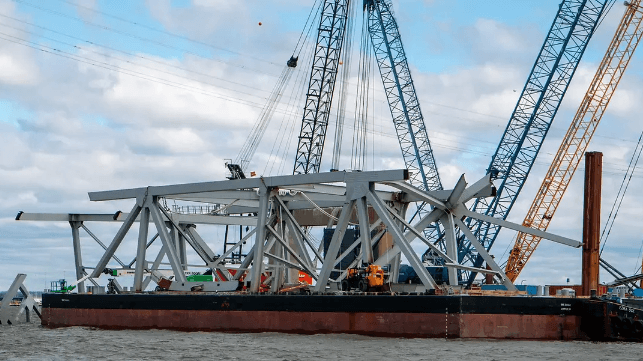Contractors Remove 150-Tonne Section of Baltimore's Key Bridge

On Saturday, contractors for the U.S. Army Corps of Engineers completed the removal of a 156-tonne piece of Baltimore's Francis Scott Key Bridge, bringing the response one step closer to completion. The bridge's one-piece truss collapsed after the boxship Dali hit a pier on March 26, killing six and prompting a multi-month effort to reopen the shipping channel.
The section removed Saturday was from Span 19, outside of the main channel. Contractors hoisted it onto a barge for later dismantling; the scrapping work will take place at the nearby Tradepoint Atlantic terminal.

Salvor inspects the wreckage aboard the boxship Dali (USACE)

Image courtesy USACE
Divers recovered a third body from the wreckage on Friday, bringing the number of missing to three individuals. The victim has been identified as Maynor Yasir Suazo-Sandoval, 38, a member of the pothole-repair crew that was working on the bridge deck when the ship hit the pier.
Suazo-Sandoval's body was recovered from inside a vehicle in the wreckage. The diver did not find any other bodies within or near the vehicle, Maryland State Police Superintendent Col. Roland Butler Jr. told local media.
On Sunday, Maryland Governor Wes Moore confirmed the most specific timeline yet for the full resumption of shipping in and out of the Port of Baltimore: the end of May.
“It is an aggressive timeline but we are going to work around the clock to make sure we hit this timeline,” he told CBS News.
The U.S. Army Corps of Engineers issued a similar forecast last week, predicting that a 35-foot channel would be open by the end of April and that the fairway would be fully restored by end of May.

that matters most
Get the latest maritime news delivered to your inbox daily.
Rebuilding the Key Bridge will take far longer, and will be far more costly. The White House has asked Congress to fully fund a replacement right away, while state and federal governments will look at legal options for recouping costs later (from the shipowner or the operator).
